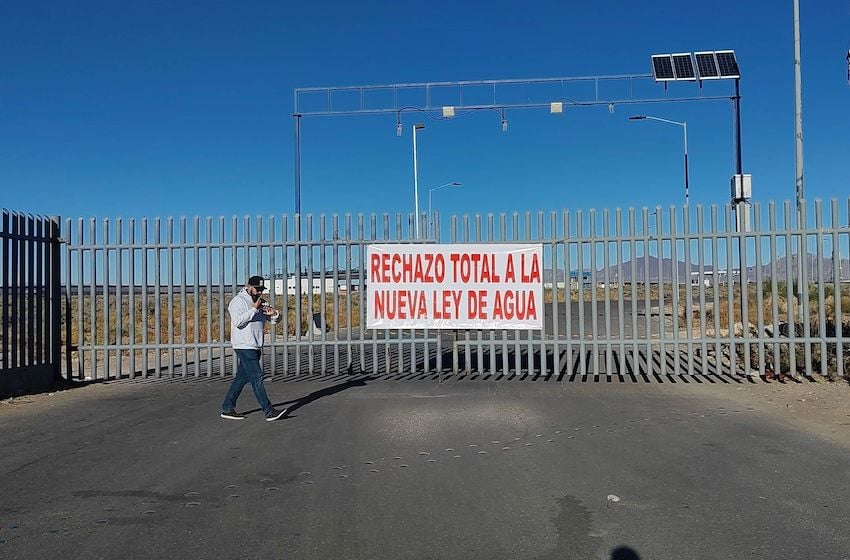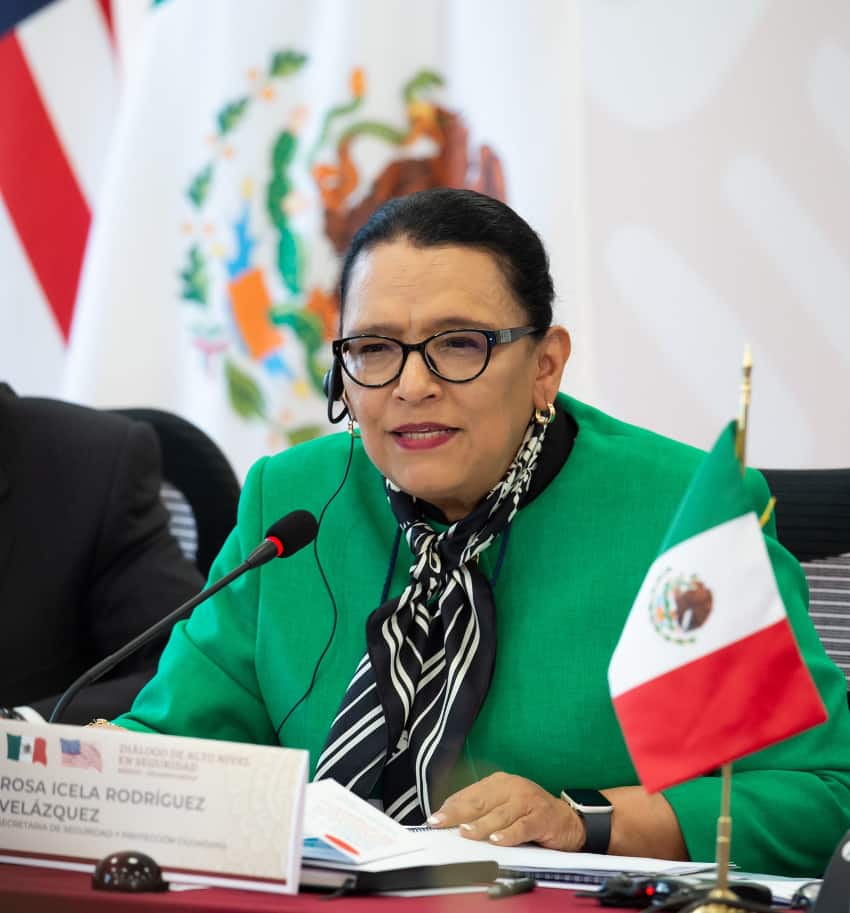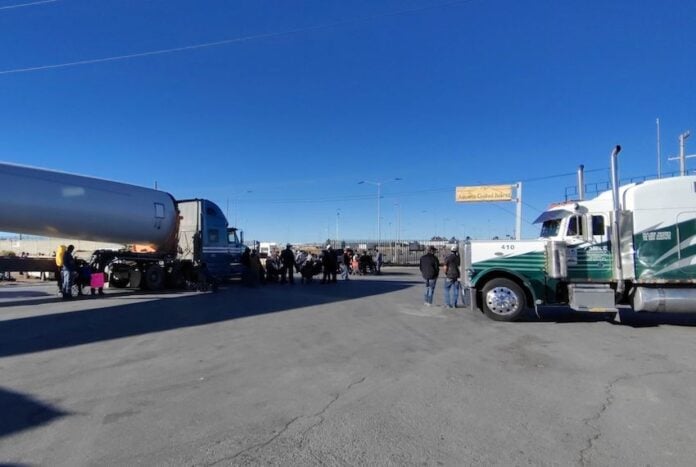As part of a nationwide protest against low purchase prices for crops and proposed changes to the National Water Law, farmers in the northern border state of Chihuahua broke into the customs office at the Córdova-Las Americas International Bridge in Ciudad Juárez on Monday.
Disgruntled farmers also blocked access to border crossings between Ciudad Juárez and El Paso, Texas, preventing large quantities of goods from reaching the United States, the main destination for Mexican exports.
🚜 Campesinos chihuahuenses mantienen cerradas las aduanas internacionales en Ciudad Juárez como medida de presión ante la reforma a la Ley de Aguas Nacionales. Productores de maíz, chile, sorgo y alfalfa denuncian que la legislación afectaría de manera irreversible su actividad… pic.twitter.com/xm2gxXmBRn
— La Silla Rota (@lasillarota) November 25, 2025
The actions were part of the megabloqueo, or mega-blockade, in which truckers and farmers shut down highways in more than half of Mexico’s 32 federal entities on Monday. Some other border crossings to the U.S. were also blocked.
While farmers want greater support from the federal government and are not happy with proposed changes to the National Water Law, truckers want greater action to combat insecurity and extortion on the nation’s highways, on which trucks are frequently targeted in robberies.
Farmers’ forced entry into the customs office at the Córdova-Las Americas International Bridge occurred at around 9 a.m. Monday. They were led by Eraclio Rodríguez, a leader of the National Front for the Rescue of the Countryside (FNRCM).
“You’re not going to arrest us, it’s a protest. We’re not criminals, you have no reason to have the damn doors closed,” Rodríguez told security personnel in an encounter captured on film.
“Here we are and we’re not going to leave until the employees vacate,” said another FNRCM leader.
The newspaper La Jornada reported that the farmers “forced the workers to vacate” the customs office.
“We’re not going to allow customs procedures to be carried out in order to slow down trade between Mexico and the United States a little,” Rodríguez told La Jornada.
The blockades of the Córdova-Las Americas International Bridge and the Ysleta–Zaragoza International Bridge between Ciudad Juárez and El Paso, as well as the nearby Santa Teresa Port of Entry between San Jerónimo, Chihuahua, and Santa Teresa, New Mexico, continued into the night on Monday. In the case of the Córdova-Las Americas International Bridge, the blockade and protest continued on Tuesday afternoon, according to the Reforma newspaper, which reported that the occupation of the customs office had surpassed 24 hours.
Some 1,500 U.S.-bound tractor-trailers were left stranded due to the blockades, La Jornada reported. Private light vehicles were allowed to pass through the roadblocks and pedestrians were able to cross into the U.S. as well, according to media reports.
On Tuesday morning, the Ministry of Infrastructure, Communications and Transport reported that trucks were still being prevented from passing blockades on four highways in Chihuahua, including that between the state capital, Chihuahua city, and Ciudad Juárez.
Farmers from municipalities in southern Chihuahua also blocked the railroad that runs between Mexico City and Ciudad Juárez.
‘Total rejection of the new water law’
In an interview with La Jornada, Rodríguez, the FNRCM leader, complained that corn buyers, including large corn flour and tortilla companies, aren’t complying with agreed per-kilogram prices. He also said that farmers maintain their demand for a federal government guaranteed purchase price of 7,200 pesos (US $390) per tonne of corn.

Rodríguez added that farmers are opposed to the government’s proposed National Water Law modifications, which he described as having a “punitive spirit.”
Gerardo Fierro, one of the farmers protesting at the Córdova-Las Americas International Bridge on Monday, told the EFE news agency that approval of the water law reforms would leave farmers without the right to extract water from wells.
“The government says that the water belongs to the people, and that’s why we’re defending it,” he said.
“… We don’t want [the government] to monopolize water and to do whatever they want with [water] permits,” Fierro said.
Fidel Mendoza Hernández, a farmer and representative of a Plant Health Local Board in Chihuahua, told EFE that the new water law “would strangle” the Mexican countryside.
“They would make us criminals when they cancel our water well titles. We will no longer be able to do what our fathers and grandfathers did,” he said.
Ricardo Monreal, the Morena party’s leader in the lower house of Congress, said Monday that the proposed new water law, as it is currently worded, will be modified to allow agricultural water concessions to be transferred or inherited in their current form.
However, in Ciudad Juárez on Monday, farmers made their view clear by hanging a banner on the Ysleta–Zaragoza International Bridge that read: “Total rejection of the new water law.”
Farmers also complained about high prices for diesel in Mexico.
“In the United States, a farmer buys diesel for 14 or 13 pesos [per liter]. We’re buying [a liter] at 24 pesos. We can’t compete,” said Fierro.
Mendoza complained that farmers don’t receive any assistance to help cover the costs of buying diesel and other essential inputs. “It’s now very difficult to produce in Mexico,” he said.
Farmers in Ciudad Juárez called for “real” negotiations with the federal government, discussions in which their views and demands are genuinely listened to and taken into account.
Rodríguez said that the government needs to recognize the FNRCM as an “interlocutor” in the negotiations before the organization will engage in dialogue with the federal Interior Ministry.
Government reports highway blockades in 17 states
The federal Interior Ministry (Segob) said in a statement that truckers and farmers blocked highways in 17 of Mexico’s 32 states on Monday, causing a range of impacts on citizens as they sought to go about their everyday activities.
“In total, 29 blockades were reported, 17 of which occurred on federal highways and the rest on state highways. Of these, 17 were full closures and the rest partial,” Segob said, adding that protests were also held at three toll booths and one customs office — that in Ciudad Juárez.
Blockades were still in place in highways in various states on Tuesday, including Guanajuato, Michoacán, Jalisco, Puebla, Tlaxcala, Hidalgo, Sinaloa, Sonora, Durango, Tamaulipas and Chihuahua, according to the newspaper Reforma.
Segob asserted that there was no reason for the blockades to take place, saying that the federal government is “always” ready to listen to “social demands.”
“During the past weeks, more than 200 meetings have been held between federal authorities and farmers to address concerns and make progress on agreements,” the Interior Ministry said.
“In addition, for months there have been working tables with the National Guard and the Ministry of Infrastructure, Communications, and Transport [aimed at] guaranteeing the safety of highway operators, as well as the protection of their routes and goods. For that reason, only one transport group protested, while the rest of the organizations, which are in talks, distanced themselves from the mobilizations,” Segob said.
The ANTAC truckers’ group was one of the main organizers of the megabloqueo.
Interior minister claims that protesting agricultural leaders belong to opposition parties
At a press conference on Monday, federal Interior Minister Rosa Icela Rodríguez asserted that “apart from being leaders of the countryside,” protesters from groups such as the FNRCM and Movimiento Agrícola Campesino farmers’ group “belong to political parties.”
“They belong to the PRI, they belong to the PAN and they belong to the PRD,” she said, referring to Mexican opposition parties.
“It’s not that I say it, they have a political history,” Rodríguez said.

The federal government also accused opposition parties of involvement in the so-called “Generation Z” protests that took place in cities across Mexico on Nov. 15.
The national president of the National Action Party (PAN) said it was “ridiculous” to link his party to the protests on Monday.
“If thousands of truckers [and farmers] are willing to close highways, it’s not for pleasure, it’s out of desperation,” Jorge Romero said.
Institutional Revolutionary Party politicians also rejected the claim that PRI members were involved in organizing the megabloqueo.
In a statement, the PRI’s leader in the lower house of Congress, Rubén Moreira, said that Mexico today is hearing “two chimes that cannot be ignored: that of the truckers who demand safe routes and that of farmers who defend their right to water and complain about the neglect of the government.”
“They’re not isolated protests. They’re alerts from the real country that sustains our daily life, because when the road becomes a territory of risk and when water is administered without justice, what’s at stake is not a sector, but rather the very productive life of the country,” Moreira said.
With reports from La Jornada, Reforma, EFE, Noroeste, El Heraldo de Chihuahua and DW
